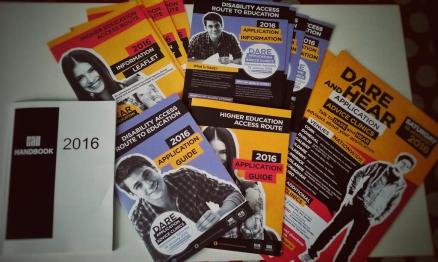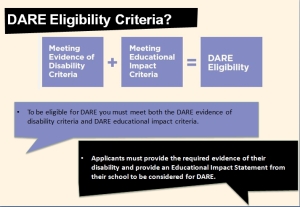
HEAR (Higher Education Access Route) and DARE (Disability Access Route to Education) are schemes that seek to offer University places on reduced points or extra college support for applicants that are coming from social or economically disadvantaged backgrounds, or who are disadvantaged for reasons of a disability or learning difficulty.
We did a blog post last year outlining the different ways that you could apply and what the criteria was etc. There have been some changes this year to the DARE scheme, so we thought we would flag up the changes and remind people what the basic criteria was for each scheme. The blog post from last year can be found here (part 1) and here (part 2)

DARE
DARE is available for school leavers under 23 who have a disability, and that can demonstrate that the disability has a negative impact on their education. the DARE Team have a list of the types of disabilities or specific learning difficulties, along with what documentation or evidence that is needed to go with the application.

HEAR
HEAR is available to school leavers under 23 who may come from social and economic backgrounds that has a negative impact on their education. Other than income, some backgrounds are under represented in university intake, so HEAR attempts to provide support to students in families that haven’t traditionally continued into higher education.
Changes to the DARE scheme for 2017
- This is the second year of changes to the scheme. Some were introduced last year including a change to define the scheme as one aimed at students whose disabilities have had a negative impact on their education. With this came an evidence based Education Impact Statement. Verification of disabilities could be done by GPs from last year, and a prioritisation of students eligible for both DARE and HEAR.
- After a review of the 2016 changes, some more adjustments have been made
- If applying on the basis of a specific learning difficulty, psychological assessment reports can not be of any age, however, attainment scores (whether from school or psychologist) must be from after 1 Feb 2015.
- Development Coordination Disorders are no longer required to submit a full pyscho-educational report from the previous 3 years – they can by of any ange.
- GPs can now complete the confirmation of diagnosis.
- Instead of a statement there is now an ‘Educational Impact Statement checklist’ that is done by the person applying alongside their teacher
- The school section of the Education Impact Statement has been reduced, which the Scheme says will make it easier for schools to complete and for parents and applicants to understand.
- Applicants don’t need to include previous schools if they have changed secondary school (unless their current school is unable to capture the impact of the disability).
- There is a more comprehensive teachers manual.
Further reading
The DARE Handbook 2017
The DARE Information leaflet 2017


